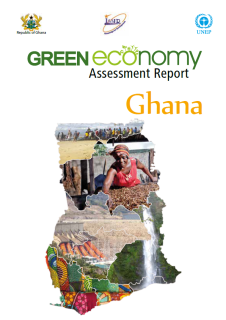Between 1991 and 2013, Ghana experienced an impressive decline in absolute poverty from 51.7 per cent to 24.2 per cent. However, the cost of environmental degradation to the country has been high. In 2012 it was estimated that the cost to Ghana of environmental degradation was equivalent to ten per cent of its GDP. In 2012 figures that amounted to US$4.1 billion. By placing sustainability at the heart of its development planning, Ghana will be better positioned to address challenges of unemployment, sustained economic growth and poverty reduction.
This study – the Green Economy Assessment Report for Ghana - provides comparative scenarios for future growth that estimates economic, environmental and social impacts. It provides recommendations on how greening the agriculture, energy and forestry sectors can catalyze a transition to a green economy in Ghana. Furthermore, the study shows clear economic, environmental and social benefits from a transition to a green economy such as strong economic development coupled with more efficient use and preservation of natural resources. Ultimately a transition to a green economy is helpful for Ghana achieving multiple Sustainable Development Goals.
Ghana, like a number of countries in Africa, is undertaking policy reforms and green investments calibrated to mitigate against poverty and hunger, climate change and natural resources degradation, while simulaneously providing new and sustainable pathways to inclusive economic development and prosperity. Ghana’s current national development plan - the Ghana Shared Growth and Development Agenda II (2014-2017) promotes the adoption of the principles of green economy in national development planning. Ghana has also embarked on other initiatives addressing environmental fiscal reform, climate change adaptation and climate change policy and is looking to build a more robust and sustainable economy.

